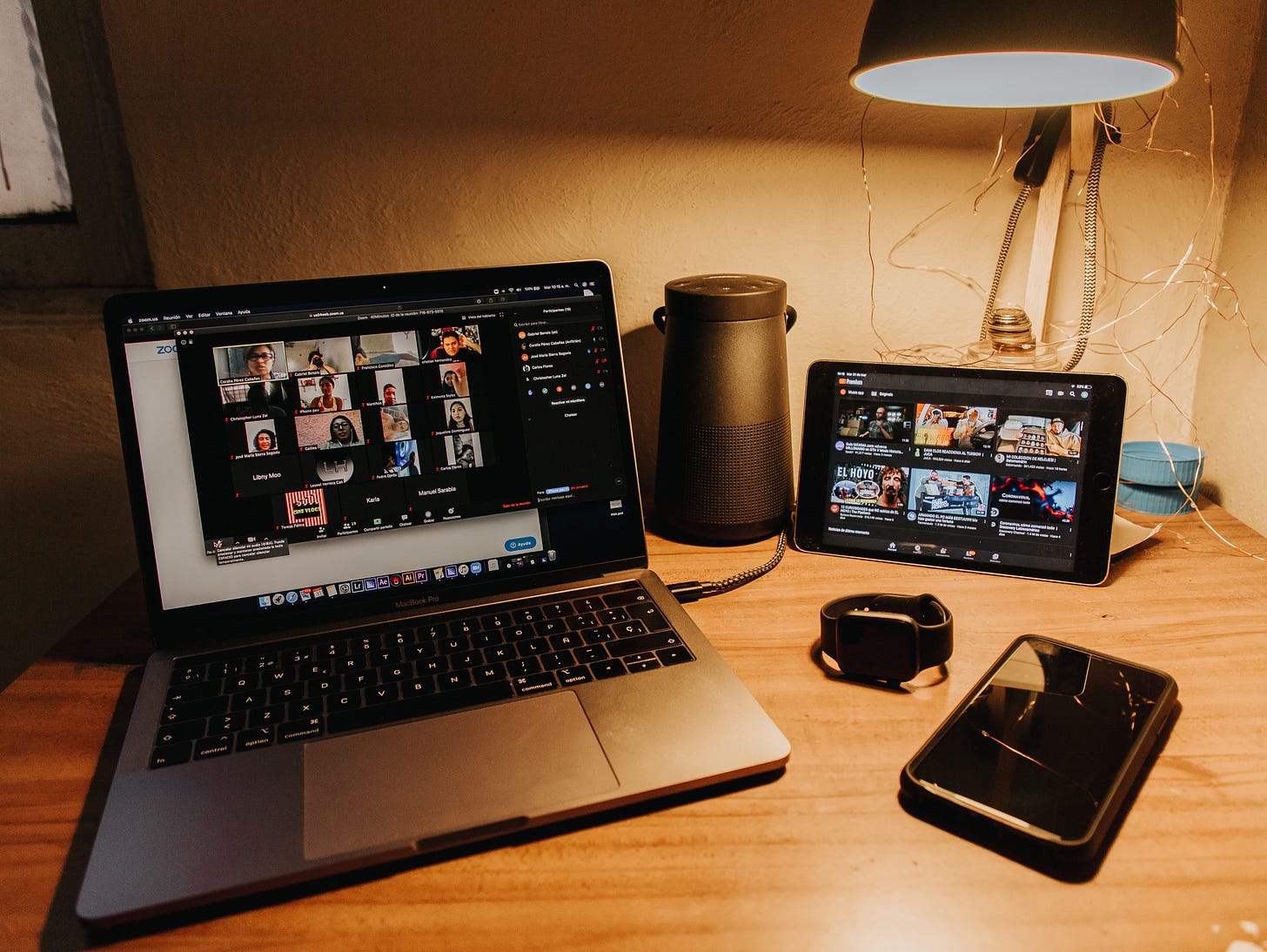Welcome to Learned, a short, weekly look at language, education, and everything else under the sun. I’m Joel, linguist, teacher, slacker. This week, we're zooming in.
subscribe | unsubscribe | comments | twitter | about
Language can change pretty fast. Especially when driven by a host of sociological changes and emotional stresses like those you might find in, oh, I dunno, a global pandemic. One of the words that has got my attention at the moment is a simple verb of movement: zoom.
Right now, zoom is undergoing a familiar proper-noun to generic verb conversion that may or may not be permanent. Usually, when we see a brand name become a generic word we see a pattern of invented-word as proper noun becomes common noun becomes common verb. Think about the word band-aid. It was created by advertisers to label a specific product. But, then, two things happened. People found the word band-aid to be really useful for describing a small adhesive bandage. It filled a unique semantic void in the language and enabled smoother, faster communication. So, when similar products by other companies began to flood the market, the general public found it easiest to just label them all as band-aids rather than trying to shoehorn the awkward small adhesive bandage into daily conversations. Add a few more years of use and the common noun has now become a verb as well, cementing it as a common part of the language.

In tech circles, the common noun phase of the cycle is usually skipped over and the proper noun becomes a verb almost overnight. Think google, instagram, and Facebook. All three of these words are commonly used as verbs even though none of them were designed that way.* But zoom is different. Zoom was already a verb when a company called Saasbee decided it would make a much better name for their company. And thus nine years and one pandemic later, we're all using zoom as a verb but in a way completely different from its previous inception.
Zoom began life as an onomatopoeic word denoting speed. Generally speaking, onomatopoeic words in English are relegated to the realm of children's speech. Because, well, when you don't know a lot of words and you're learning to describe the world around you, vroom and whoosh and eek can be really useful. But zoom begans to evolve quickly and continues to do so even now. The verb keeps its childish connotations and gets used to evoke childlike senses of wonder and freedom, like in Mazda's turn-of-the-century Zoom Zoom campaigns. In these televised spots a young boy turns to the camera and says, "zoom zoom" before cars come whizzing down the road. Oooh, ahh.
However, zoom also quickly acquires its first noun usage. In the early 20th century, as aviation captures the public imagination, pilots began to popularize the word (as a verb). It retains its sense of fun and wonder as a verb but becomes more serious as it quickly gains its secondary meaning of “to quickly get closer.” Within a couple of years, camera kits are being sold with zoom lenses which allow you to, well, quickly get closer to the action. But, with the new technology comes a need for new vocabulary to describe the act of using a zoom lens. Enter the adjectival verb coinings zoom in and zoom out. The branchings continue.
In recent years, zoom has evolved into yet another new noun: zoomies. While not an official word yet (I don't think; I haven't checked), zoomies is in pretty constant use on the internet to describe a pet's - usually a cat or a dog - need to suddenly tear around a room or yard or park given the slightest opportunity to do so. This new form combines zoom's carefree and onomatopoeic roots with its sense of movement. But the branching meanings continue.

Zoom, as I, and I suspect you, have been using it most recently could be defined as, "to participate in a video call." This would make it synonymous with Skype, FaceTime, LINE, and numerous other video call apps and services, should we use those product names as a linguistic shortcut. But I don't think zoom is done evolving.
I suspect that zoom will eventually gain another adjectival pairing to replace the current, awkward "join a zoom call." On the other hand, it's possible that zoom has, Pokemon-like, achieved its final form and this is the last evolution of the word we'll see for a while. Maybe the next evolution will be when we finally have Star Trek's transporter technology and we'll just zoom on over to the next planet. One can hope. But, in the meantime, I've got to zoom into a class.
subscribe | unsubscribe | comments | twitter | about
Stay safe, stay strong. Call someone.
Joel
Sources:
*There is some debate in linguistic circles over whether these words can properly be called generic: can you google something on bing? Can you Instagram something to Flickr?




